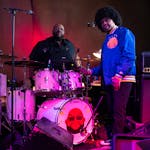Jonathan Cohen sits at a harpsichord when leading the St. Paul Chamber Orchestra in concert, tinkling the keys and occasionally waving his right arm to cue the musicians.
To the naked eye he seems to be not doing much, but appearances can be deceptive.
Playing as beguiling and exquisitely stylish as the SPCO produced during Saturday evening's program of baroque and early classical music at the Ordway needs scrupulous preparation at rehearsals, and Cohen's influence on the orchestra has been palpable since he joined two years ago as an artistic partner.
It showed in the delectably light, transparent textures Cohen achieved with the players in the Fifth Concerto Grosso of Charles Avison, an English contemporary of Handel.
The two quicker movements had a nimble light-footedness typical of ballet. In the fugal material of the second slow movement, Cohen's patient layering of the different string lines achieved a quiet intensity that drew the listener inward.
Articulation was a touch more emphatic in the busier instrumentation of the fascinating Sinfonia in A minor by the Czech baroque composer Jan Dismas Zelenka.
Generous opportunities existed for individual players to take the spotlight. The Andante movement harbored a three-way conversation between oboist William Welter and bassoonist Brad Balliett — both impressing as guest players for the evening — and concertmaster Ruggero Allifranchini.
Balliett popped up again in the finale, in chortling conversation with principal cello Julie Albers.
Cohen drew highly spirited playing from an ensemble of 20 players, raising an obvious question: Why is a composer of Zelenka's sharp originality so rarely featured on the modern concert platform? The neglect is puzzling.
C.P.E. Bach, second surviving son of Johann Sebastian, used to be similarly neglected, but in recent years his star has been steadily rising.
The Sinfonia in E minor was a terse reminder of C.P.E.'s almost obsessively inventive music. Cohen drew bracingly taut, articulate phrasing from the orchestra, especially in the knockabout finale, where the skirling violins bolted like a startled jackrabbit.
The most delicate playing of the evening came in the concluding item, Haydn's "Morning" Symphony, one of a trilogy of works linked to times of the day.
Hushed violins heralded the depiction of daybreak at the symphony's opening, and Cohen's unraveling of the gradual crescendo revealing the sunlit scene was picture-perfect.
Diaphanously quiet playing also characterized the Adagio movement, providing a soft ambience for the sweet solo musings of first violin Allifranchini, a peerless Haydn stylist.
Balliett's affable bassoon resurfaced in the Menuet's trio section, in droll dialogue with the scuttling double bass of Zachary Cohen.
Allifranchini's short, zippy cadenza capped a zesty performance of the carefree finale, where the solo breaks of principal flute Julia Bogorad-Kogan provided a garrulous running commentary.
Cohen bowed modestly at the symphony's conclusion, deflecting attention to the SPCO players. His specialist input, though, was unmistakable in this heart-lifting, enjoyable concert.
Terry Blain is a freelance classical music critic for the Star Tribune. Reach him at artsblain@gmail.com.






